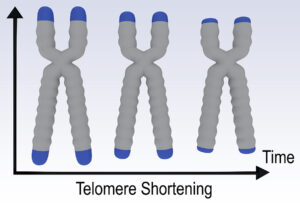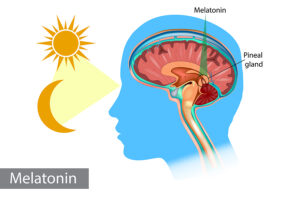Recent research showed that cancer in younger adults is due to accelerated aging. Researchers presented a paper at the American Association for Cancer Research (AACR) Annual Meeting 2024. They discussed in detail how cancer presents in aging tissues.
Details of the study
Researchers examined the UK Biobank databases of 148,724 individuals aged 37 to 54 years. 9 biomarkers from blood of these patients served to calculate the biological age of these patients. The following were the blood tests: albumin, alkaline phosphatase, creatine, C-reactive protein, glucose, mean corpuscular volume, red cell distribution width, white blood cell count, and lymphocyte proportion. I will discuss below how they calculated the biological age from these factors. In most patients there was a discrepancy between the chronological age and the biological age.
The researchers also checked the cancer registries to check how many cancer patients were found before age 55. Nearly 3200 cancers were found. Patients born between 1950 and 1954 were compared to patients born in or after 1965. Surprisingly the younger patients (born in or after 1965) had 17% higher accelerated aging. This made this group more prone to develop early cancers.
Significance of accelerated aging regarding cancer frequency
The researchers also found that increases in accelerated aging were associated with a significant risk of early-onset lung cancer, early-onset gastrointestinal cancer, and early-onset uterine cancer. Individuals who had the highest amount of faster aging were compared to people who had the smallest amount of faster aging. The faster aging group had twice the risk of early-onset lung cancer, more than 60% higher risk of gastrointestinal tumors, and more than 80% higher risk of uterine cancer.
Calculating the biological age
The following is a list of items to calculate the biological age (taken from this CNN source):
- albumin: a protein made by the liver that declines with age
- creatinine: a waste product in blood produced by protein digestion and the breakdown of muscle tissue; a measure of kidney function. Lower levels correlate with better longevity.
- glucose: With age, blood sugar stays higher for longer after meals.
- c-reactive protein: made by the liver in response to inflammation; relatively higher levels correspond to faster aging
- lymphocyte percent: The concentration of these white blood cells related to immune function tends to decrease with age.
More items to calculate biological age:
- mean cell volume: a measure of the average size of red blood cells, which increases with age
- red cell distribution width: the difference between the size of a person’s smallest and largest red blood cells, which tends to increase with age
- alkaline phosphatase: an enzyme produced mainly by the liver and bones that tends to increase with age
- white blood cell counts: Numbers of white cells in the high end of the normal range in the blood may correspond with greater aging.
Using these criteria, a research group developed the algorithm PhenoAge. This is how the biological age was calculated.
What factors lower the biological age?
There are 8 essential components that determine your biological age: diet, physical activity, avoiding nicotine exposure, sleep health, lower body mass index (BMI), cholesterol, blood sugar, and blood pressure. This link states that when you optimize this list of 8 essential components your biological age will be 6 years less than your chronological age. It will make you resistant to several diseases including cancer.
Your telomere length is important to reduce your biological age
Researchers know for some time that telomere length determines the biological age. Telomere length determines how old we get. It also can predict whether we get illnesses like cancer and cardiovascular diseases as we age. In addition, it determines whether you get the blessing of longevity or not. Researchers showed that two lifestyle habits, namely a Mediterranean diet and regular exercise, preserve our telomeres to give us a younger biological age.
Effect of Junk foods on our biological age
Too many people eat unhealthy foods like processed meats, French fries, hamburgers and other processed foods. How does this affect your lifespan? When we consume unhealthy foods and beverages, like sugar-sweetened beverages and highly processed foods, we gain weight. Obesity and other chronic conditions are the results that put us at a higher risk regarding at least 13 types of cancer. Included in this are endometrial (uterine) cancer, breast cancer in postmenopausal women, and colorectal cancer.
How can we counter the devastating effect of highly processed foods?
We need to buy whole foods that were not processed. Buy fresh vegetables, fruit, nuts, organic chicken, fish like wild salmon. Cook your own meals. This link describes anti-aging foods that help you to enjoy a longer life with less diseases. Other studies showed in the past that this type of food preserves your telomeres, prevents many cancers and prevents heart attacks and strokes.
Discussion
The study in the beginning of this review showed a higher cancer frequency in younger patients. This is a new concerning trend. But the study failed to show the reason behind this. In my opinion it is the fact that younger people nowadays have poorer lifestyles than in the past. They consume junk foods and larger amounts of alcohol regularly. This behavior pattern causes shortening of telomeres, lowering of the biological age and the emergence of diseases mentioned above. We need more research into the causes of telomere shortening in younger patients. Also, why do they experience accelerated aging with an increase in the biological age? The research paper shown in the beginning of this review was done on a British population.
There is a need for other studies
A similar study with a more diverse population including a record of their eating habits would be welcome. Apart from measuring the biological age, measuring the telomere length would also be useful. In addition, a control group of younger people who consume healthy foods would help as a contrast. This control group likely would have a lower biological age and longer telomeres than the experimental group.
Conclusion
In the beginning of this review, I described a study about younger patients. They had an accelerated biological age with a higher rate of various cancers. I showed that other researchers examined telomere length and the longer it was the less cancer the patients got. I mentioned that eating junk foods, processed meats and consuming sugary drinks was bad for your health. This accelerates your biological age and shortens your telomeres. As this study was based on a British cohort, we need new research that concentrates on a more diversified population. Apart from measuring the biological age, measuring the telomere length would also be useful. In addition, a control group of younger people who consume healthy foods would help as a contrast. This control group likely would have a lower biological age and longer telomeres than the experimental group.















